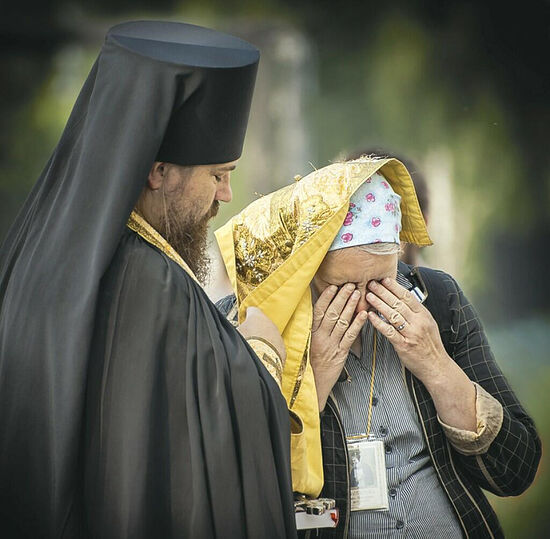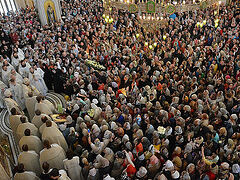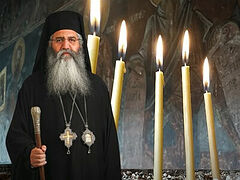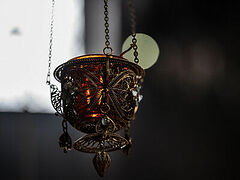Most people who convert to the faith as adults are entering into the life of the Church, which is absolutely unknown to them, and often walk this path with difficulties, disappointments and doubts. This is an internal path, but it has its own laws, and if we don’t know them our transformation into true Christians is filled with mistakes and obstacles. How can we go through it properly and find spiritual support? We discussed this difficult topic with Archpriest Valery Gensitsky, head of the Andreevsky Deanery and rector of the Church of Apostle Andrew the First-Called in the town of Marx, Saratov region (Pokrovsk Diocese).
Believe with your heart
—Father Valery, you have been in the Church for a long time, from childhood. You saw the times when people were forcibly alienated from the faith, then when they returned to the Church, actively entering Church life, and then becoming slack and even spiritually declining. Which time was the best?
—When it comes to the question of the best time, I will answer that the present is the best. You can complain every day that everything is bad and wrong, but at the same time you can say that everything is fine even if there have been some difficulties. It all depends on your inner state. We must always thank God for getting us through every day we live, no matter what this day may bring us. Glory to God for all things!
I grew up in Ukraine and spent my childhood near the Pochaev Lavra. The famous Brest Fortress, which took the first blow during the Nazi invasion in 1941, is not far from it—on the border with Belarus. And the Lavra is an Orthodox stronghold: throughout its history it has been our spiritual defense on our western frontiers.
I remember us walking to the Lavra barefoot for almost six miles. The path (we called it the “little highway”) was all strewn with small pebbles. It hurt our feet as we walked and jumped. We would not put our sandals on until we approached the church. We would spend the night in the Lavra, confess in the morning, take Communion and have a small meal somewhere. Nothing in life was tastier than that meal: homemade bread, tomatoes, and herring with potatoes.
We would walk back joyful and happy, without feeling the long distance because we had been to those great holy shrine—the Pochaev Icon of the Mother of God, the relics of St. Job of Pochaev and his cave. After the service we would get to the top of the bell tower, and after a monk had rung the bells we boys pressed against the clapper of the big bell, while it was still warm from the strokes. I still remember this living warmth and my childish delight.
There was no strong oppression of the Church in our area, and all the Orthodox traditions were respected. We never heard at a funeral: “May you rest in peace”, but only “May God grant you the Kingdom of Heaven.” This is where my spirituality began, and entering the life of the Church was completely natural. At that time people went to church, to God, realizing in their hearts that they were coming to their Heavenly Father.
—Isn’t it like that today?
—Today people come to church either through sorrows and everyday problems or through education and books. May God grant that the people who have converted to the faith with their minds begin to believe with their hearts as well. But the majority of people are coming with daily problems: an operation, illness, childbirth, someone’s son was drafted into the army, someone’s husband drinks, family life isn’t going well, etc. All they want from the Church is change in their lives so that things can sort themselves out. They light a candle and wait for God to fulfill their requests, give them success, good health, and money.
—But isn’t it natural? Each person has his own material and worldly concerns. Didn’t God Himself command: Ask, and it shall be given you (Mt. 7:7)?
—Yes, it is natural to turn to the Lord for help in our needs, but our needs should not obscure the Lord’s face from us. Our prayer requests to Him should be part of our Christian life, and not the ultimate goal.
The Lord did not come to earth to distribute bread to everyone. He came to save us. Christ could have worked as many miracles as He pleased, but miracles were rare because He did not want to attract people’s attention by them, but by faith. The apostles left everything and followed Him, although at first they did not understand what He was speaking about. They were not welcomed everywhere; they were met with sticks and stones. They did not expect or ask anything from Christ, but their meeting with Christ became the most important event in their lives. It was the same for our grandmothers (in Russia), too.
Today unfortunately people come to church with a consumerist attitude, almost like to a store: “I’ve come to You, God, but You haven’t heard me. God is not what I expected Him to be, so I am offended!” You see, there is a difference between a person who wants something from God and who wants only God.
Struggle with yourself
—Integration into Church life is the stage that every person who has stepped over the church threshold goes through. But a person can study the rules of church life and remain only outwardly religious.
—Just obeying rules doesn’t mean you live a religious life. If you don’t have peace, kindness, and love in your soul, you are not living the life of the Church. The trouble is that people often think that that since they go regularly to church, they are “not like others.” This is the ego preventing them from seeing the beam in their own eyes while noticing the mote in someone else’s. Standing through the service, reading the prayer rules, and listing your sins at Confession—these are all purely external actions. True spiritual work is when you struggle with yourself.
—How can I know if I’m on the right track or not? I don’t think I’m getting it quite right.
—It’s good that you think so. You are looking for your way and trying something, even if you are wrong. To follow the right path one must read the Gospel and the Holy Fathers, as they give you instructions and save you from mistakes.
The most important thing is to understand that entering the Church will not make your life easier; to the contrary, you will have to work hard and learn a lot. I myself listen to smart people with my mouth wide open. Oh Lord, how much I still don’t know!
Long for this meeting
—Father Valery, is it possible for every person to meet God? Perhaps the Lord is not revealed to everyone?
—To everyone. You only need to long for this meeting. There is a well-known parable about how a drowning man was waiting for salvation from God and did not accept it from the rescuers, and drowned. But it was God Who sent him those people.
And here is a story from my pastoral practice. It was twenty years ago, when I served in Rtishchevo [a town in the Saratov region.—Trans.]. I was invited to bless a small store. We came with the choir and started to pray. The store owner and two sellers were with us. Suddenly a boy entered the store for some reason. The owner waved his hands at him: “Go away! Go away! Don’t interfere—this is a serious matter here.” The boy went out with fallen spirits. When the store was blessed, I congratulated its owner and said: “You shouldn’t have kicked out the boy. Maybe it was Christ Who came!” I wish you could have seen the owner’s face! He was very upset. Picking up a lot of chocolate, he rushed after the child, but he was long gone. The Lord may have sent the boy to test me or the man who had decided to have his store blessed… I don’t know, but we both made a mistake, and I was also confused. So many years have passed, but I can’t remember this incident without tears. So, we never know where the Lord will reveal Himself to us.”
—And we can let this meeting slip by...
—We can. We must always and everywhere be ready for this meeting. For the first time I got to Jerusalem almost illegally, but a miracle happened and I served together with Russian and Greek priests in the Church of the Resurrection of Christ—right in the Edicule. At that moment I was in a state of weightlessness, everything earthly was gone, and I vanished into happiness. I think in those moments I was with God.
Inspired by such joy, on the next visit I already felt like a hero... But I didn’t even get into the church! There weren’t enough vestments for me—it was such a great pity! My wife and twenty of my parishioners were with me: I wanted all of them to take Communion, but nothing came of it. But I understood that the Lord had lifted me up on my first visit, and now He humbled me. Then we climbed the Mount of Temptation—there is a small church there—and a monk suggested that I read the Gospel. I entered the altar, took the Gospel, and it felt as though a cloud had covered me, as on Mount Tabor. I felt I was crying and unable to read. The people around me understood what was happening to me and froze. Through sobs I somehow finished reading. I am sure that the Lord visited me again—first He humbled me so I wouldn’t become exalted like a child, and then comforted me and stroked my head.
God looks at you
—Father Valery, our church life often turns into habit and even routine. There is no spiritual growth, and the joy that we had at the beginning leaves us. How can we overcome this state?
—It’d be better not to fall into it! One shouldn’t get used to church and the joy of Holy Communion. This is a tragedy, not the least for a priest. I tell priests about this at confession. You need to approach the holy Chalice just as you would a burning fire; and like hay you can be burned by this fire. You must approach this greatest Mystery with a great feeling of trepidation and an awareness of your weakness—as if it were the first time, or even the last; what if it doesn’t happen again in your life?
—And if you aren’t in such a state, what can help?
—Probably the fear of God and the love of God. In my mind’s eye I often return to my childhood and remember the feeling of a continuous presence of God in my life, as natural as the presence of my mother. Before, everyone in their homes had a front corner with icons and a burning icon lamp in it. This place was holy. You approached it with awe, prayed and knew that God was looking at you.






